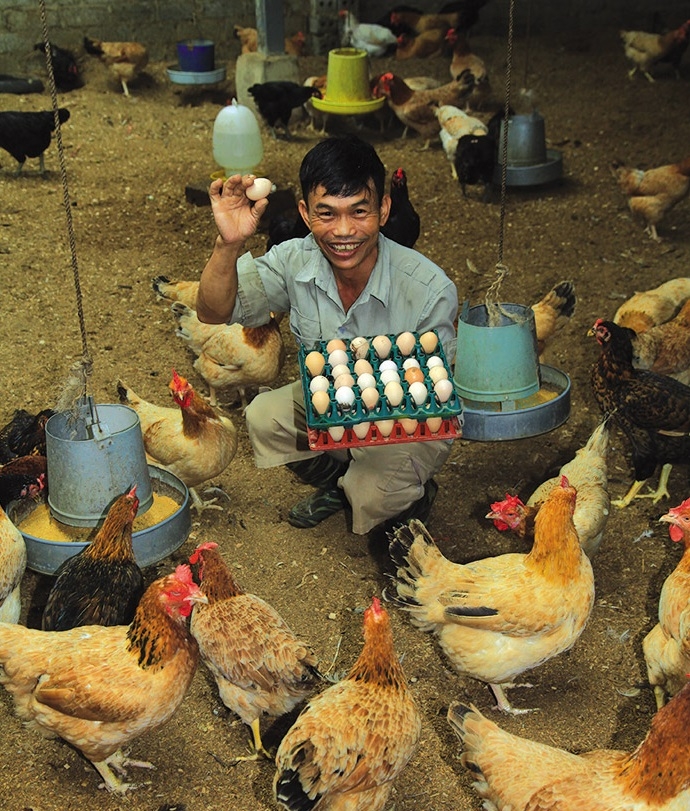Tackling food risks organically
 |
| Vietnamese consumers are becoming more aware of food safety risks |
Nguyen Ha Chi, a loyal customer of organic food stores, shared that instead of squandering money on top brand goods or dining at costly restaurants, she has spent several years trimming unnecessary expenses to buy safer food.
Consumers like Chi, however, often find it difficult to uncover which products are totally safe, and often all they can do is to put their trust in producers.
“Organic food stores now have a strong presence in the market with different price tags. I got lost in a matrix of information and have changed several producers before deciding on a specific brand. Every shop can show off its quality certificate, but the quality of their food needs to be checked by the customers,” Chi said.
Chi’s concerns are common to thousands of Vietnamese consumers who face the growing threat of unsafe food, and many of whom spare no expense on the items being branded as organic food.
Although concrete guiding regulations are in place, to save costs, some businesses have claimed that their products are organic without having any certification from a third party.
Elsewhere, some companies have acquired certification for one product, and subsequently claim that all their products have met the same organic standards, thus misleading consumers. Their abuses have led to customers turning their back on organic products and triggered questions about the true quality of organic Vietnamese items.
According to the Department of Crop Production under the Ministry of Agriculture and Rural Development, the country is now home to 26 organic production units across 15 cities and provinces.
As of February 2017 various agricultural products, mostly fresh vegetables, from 50 Vietnamese companies were certified for reaching organic standards. The products were awarded the certification after undergoing strict checking and assessment processes from prestigious foreign organisations such as the United States Department of Agriculture (USDA), Australian Certified Organic (ACO), and EM Green of EMRO (Japan).
The difficulties in regaining customer trust and competing with foreign-imported organic items in price have been the cause of “premature death” to many local organic food businesses.
More than two years ago, a company producing vegetarian fish sauce from mushrooms happily informed of investing in local material-growing areas to reduce the need for material import. The company recently announced the temporary halting of the programme due to the difficulties in finding an output market for their products.
Bui Bich Lien, owner of organic food production and distribution chain under the ORFARM brand, recalled that during 2012-2013 when ORFARM was first launched, it faced mounting hardships because at that time organic food was quite a new concept to local consumers. The ORFARM system now consists of four outlets and is supplying organic pork and chicken meat to Organica, L’s Place, and Hi-food shop chains as well as to Japan-backed AEON Mall venues in Hanoi and Ho Chi Minh City.
The hardships have not defeated Lien and many other local organic food businesses, but helped them instead to foresee a multitude of development opportunities and motivated them to strive for product perfection.
“Since food is necessary for our survival, it is a vital part of our lives. For me and many others, our health is the reflection of our daily intake. So why should we not invest in our health or our quality of life by choosing good quality food?” Lien said.
Lien and her colleagues have often organised trips to their Thuy Thien Nhu EM Green farm site in Lac Thuy district, Hoa Binh province, about 80km from Hanoi. There, customers can learn more about preliminary food processing and the farm’s totally enclosed process from production to distribution following Japan’s EMRO EM Green certificate.
After six years in operation, the ORFARM system has gradually secured customer trust and reported a steadily growing customer base.
“Yet we have a great belief that the market of organic food can grow in the near future, as more consumers are paying higher attention to the quality of the food they consume each day,” Lien said.
What the stars mean:
★ Poor ★ ★ Promising ★★★ Good ★★★★ Very good ★★★★★ Exceptional
Related Contents
Latest News
More News
- $100 million initiative launched to protect forests and boost rural incomes (January 30, 2026 | 15:18)
- Trung Nam-Sideros River consortium wins bid for LNG venture (January 30, 2026 | 11:16)
- Vietnam moves towards market-based fuel management with E10 rollout (January 30, 2026 | 11:10)
- Envision Energy, REE Group partner on 128MW wind projects (January 30, 2026 | 10:58)
- Vingroup consults on carbon credits for electric vehicle charging network (January 28, 2026 | 11:04)
- Bac Ai Pumped Storage Hydropower Plant to enter peak construction phase (January 27, 2026 | 08:00)
- ASEAN could scale up sustainable aviation fuel by 2050 (January 24, 2026 | 10:19)
- 64,000 hectares of sea allocated for offshore wind surveys (January 22, 2026 | 20:23)
- EVN secures financing for Quang Trach II LNG power plant (January 17, 2026 | 15:55)
- PC1 teams up with DENZAI on regional wind projects (January 16, 2026 | 21:18)

 Tag:
Tag:



















 Mobile Version
Mobile Version